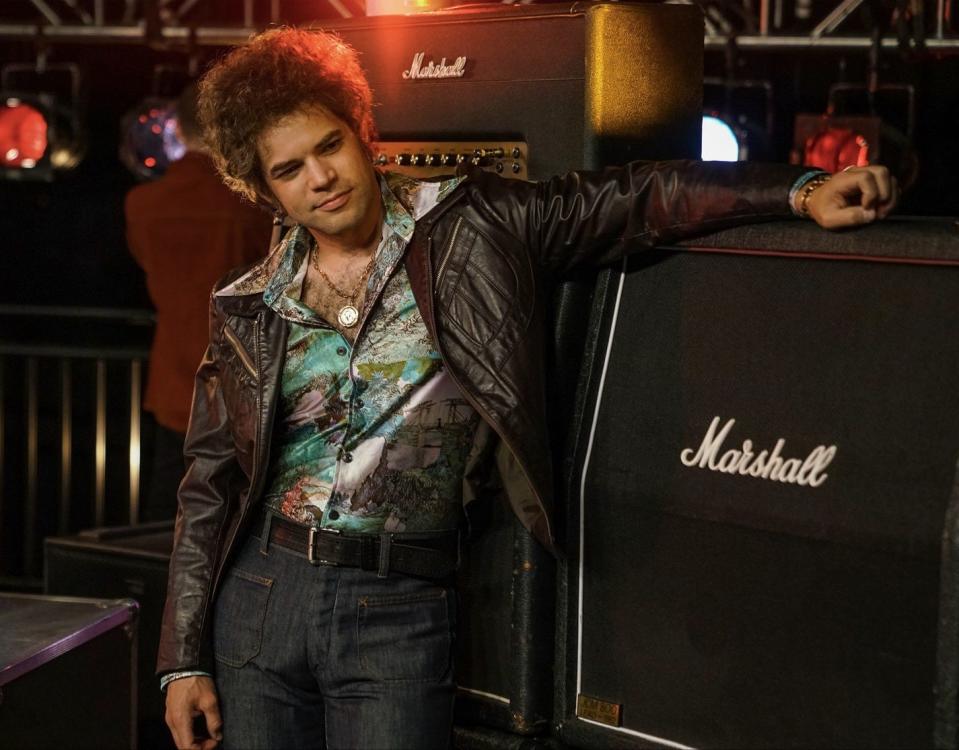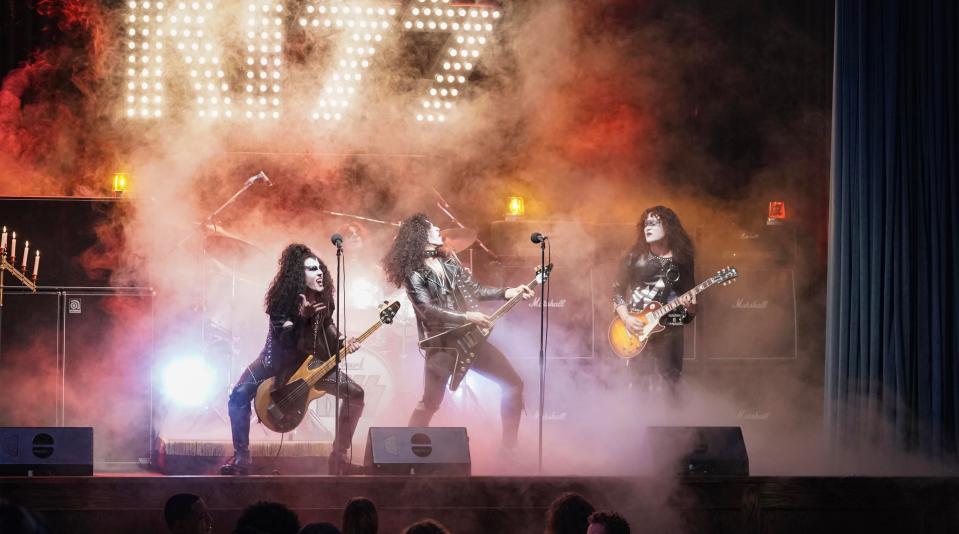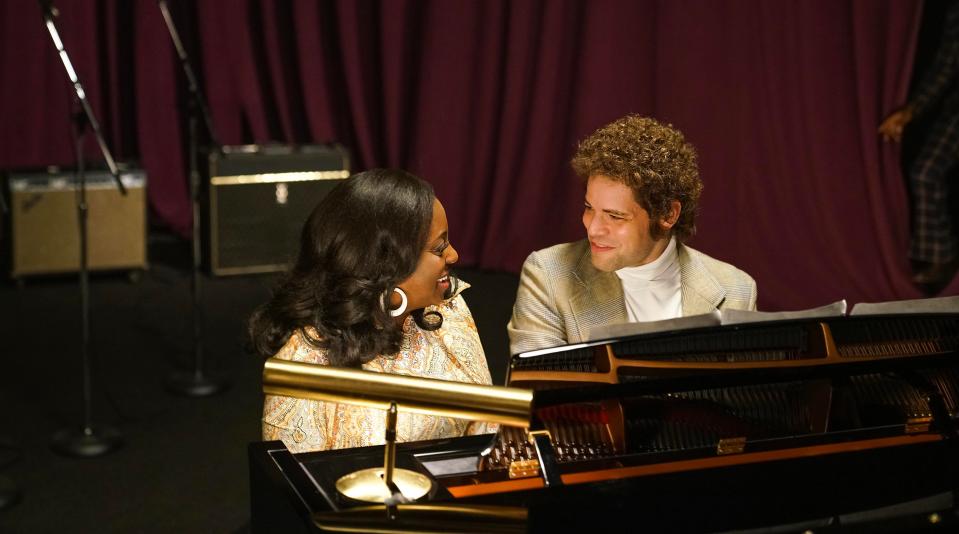'Spinning Gold' fact check: How much of the movie with Donna Summer and KISS is true?
The purpose of “Spinning Gold” isn’t to rehash the origin stories of KISS, Donna Summer, Bill Withers and other seminal artists affiliated with Casablanca Records.
It’s to accentuate the vibrant life of its founder, Neil Bogart. His name likely isn’t familiar to most outside of the music industry. But his influence still resonates as an arbiter of ’70s rock, soul and disco.
Bogart died of cancer in 1982 at age 39, and for 24 years, his son Timothy Bogart has “pushed the boulder up the hill” to complete a film about his father.
Throughout the film’s evolution, Bogart interviewed – often multiple times – formative Casablanca artists including Gene Simmons, George Clinton and Summer (who died in 2012).

A few Casablanca stars, including The Village People and Curtis Mayfield, receive only a passing mention – only so much can fit in a two-hour movie – but the ones highlighted offer a colorful glimpse of music history.
“Spinning Gold” opened Friday and will play in theaters for 45 days before heading to VOD and eventually, streaming. Bogart is also eager to present the show on Broadway, with plans to open a musical in 2024.
In the film, Neil Bogart, as played by Jeremy Jordan ("Supergirl"), offers the early disclaimer that, “Memories are tricky. We remember what we want to remember.” But Timothy Bogart, who wrote and directed “Spinning Gold,” donned his investigative reporter hat because “fidelity of the facts in this movie was consequential to me.”
Here, he confirms or clarifies some of the film’s most memorable moments.

Why did Neil Bogart have Donna Summer record a 17-minute version of 'Love to Love You Baby'?
When first released in the mid-’70s, the song that would turn Summer into the “First Lady of Love” sputtered. But months later, as Casablanca Records was possibly about to shutter (it didn’t), Bogart threw an “end of the world” party at his house and a few hours into it, he noticed something.
A partygoer grabbed a copy of the song from Bogart’s record collection and as it played, Summer’s teasing moans and coos inspired many of the attendees to essentially join in the spirit.
Timothy Bogart was a child at the time, but remembers being at the party (“Those were some formative years!” he jokes).
“Yes, people were having sex at the party to the song, but my dad declared it was too short to have sex to. The song needed to be an experience and the experience needed to be half an hour,” Bogart says. “I think he may have asked staff and friends to do some experimenting to determine the length of time the song needed to be.”
The finished version is a few seconds under 17 minutes.
Did Donna Summer touch herself while rerecording 'Love to Love You Baby'?

Summer, as reminded in the film, grew up in the church and retained her deep spirituality throughout her career. Leaning into the orgasmic throbs that anchor the Giorgio Moroder-produced “Love to Love You Baby” was a challenge because, as Bogart says, “she couldn’t fake it because she wasn’t a sexual being.”
But Summer knew what could potentially make her a star.
“She ended up on the floor, touching herself,” Bogart says. “There is no question that to get there, she had to go to a place that was so against everything she was. I believe she regretted that she was literally defined by an orgasm.”
While the film also shows Neil Bogart in the vocal booth to initially arouse Summer, the scene is a confluence of events that director Bogart smashed into one. Summer’s actual final recording session of the song was with only Moroder (portrayed by Sebastian Maniscalco) in the studio.
Did KISS really set off fire alarm sprinklers during a showcase performance?

In 1974, the struggling band performed a modified version of their explosive stage show in a room better suited to wedding receptions.
There were flash pots and fire. But no one considered the resulting smoke.
The band also didn’t want any lights on in the room, so Bogart instructed his staff to tape over the fire alarm signs.
“I don’t think they realized that KISS doing a show in a bar mitzvah venue wasn’t a great idea,” Bogart says. “Everybody hated it. Smoke filled the place and it was a disaster.”
Warner Bros. Records, which financed Casablanca, had given Neil Bogart $3 million in funding. But by the time of the KISS debacle, Timothy Bogart says, “my dad had spent $4 million.”
Did Neil Bogart generate the idea for KISS’ 'Alive' album as a final effort to break the band?
The concept of KISS was a challenge. Radio didn’t understand them. Warner Bros. Records “hated them, wanted them to take off the makeup, didn’t support them,” Bogart says.
The band’s bonkers live performances were sparking attention, but they were only the opening act for Aerosmith – not exactly a prime moneymaker.
Bogart realized that keeping a record label afloat meant making more records. But neither he nor the band had the money to produce another studio album – KISS had released three in the previous 18 months – so it became a “happy accident” to record them on tour.
“Alive!,” released in September 1975, established KISS’ reputation as party rockers unleashing every explosive toy onstage.
It also was a product of its era, when live performances still held mystique.
“KISS fans were defined by the ones who saw them in person,” Bogart says. “When ‘Alive!’ came out, they felt like they were there, and that drove more people to buy the records. The success of the album was fans going, ‘I was there; it was MY experience.’ ”
Did Berry Gordy put a hit out on Neil Bogart because Casablanca lured The Isley Brothers and Gladys Knight from Motown Records?
“I’ve been advised never to say (those words),” Timothy Bogart says with a laugh.
But, from his extensive interviews, Neil Bogart learned, as depicted in the film, there was a convention in Miami where Bill Withers – whom Motown wanted, but Bogart signed – was performing.
While in the movie, Bogart and his crew are held at gunpoint in an alley and threatened for taking Black artists from Motown, the reality didn’t include weapons being brandished.
Before the Miami convention, Bogart’s friend and Casablanca co-founder, Cecil Holmes (Jay Pharoah), received a phone call warning to get Bogart out of Miami immediately, otherwise he would be killed that night.
Holmes and Bogart complied.
“Can we draw a direct line to Berry?” Timothy Bogart asks. “It seemed quite clear where the message was coming from, but I don’t know if Berry personally did it.”
A few years later, Neil Bogart and Berry put their competitive instincts aside and became good friends.

Did Neil Bogart aid Gladys Knight with renaming 'Midnight Train to Georgia'?
The classic soul song, written by Jim Weatherly (and inspired by the long-distance romance between actors Lee Majors and Farrah Fawcett) was originally titled “Midnight Plane to Houston.”
In the film, Bogart sits with Knight at a piano as she frets over tweaking the wording to more accurately reflect her Atlanta roots, and eventually hits on the “midnight train to Georgia” phrase.
But it still isn’t clear if Knight modified the title or if it was changed by an Atlanta producer who had talked about cutting the song with Cissy Houston.
Timothy Bogart included a scene of his father and Knight together to convey the type of relationship he had with the artists on the Casablanca roster.
“He wasn’t just an executive. He was a producer and a writer and an artist,” Bogart says. “You see how deeply he worked with artists on the crafting of the songs.”
Keep spinning with more music
A live thrill: Bruce Springsteen and the E Street Band deliver
Bring the power: Ozzy, AC/DC, Iron Maiden to headline major rock fest
A welcome extension: Adele has added 34 more dates to her Las Vegas residency
This article originally appeared on USA TODAY: 'Spinning Gold' fact check: KISS, Donna Summer and Casablanca Records


